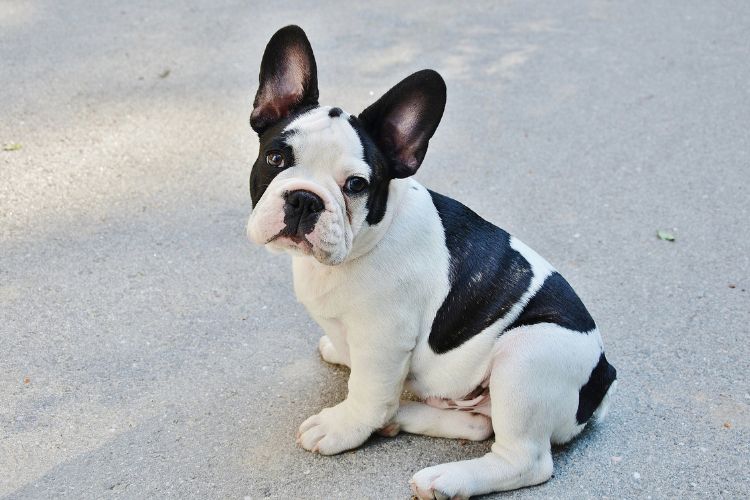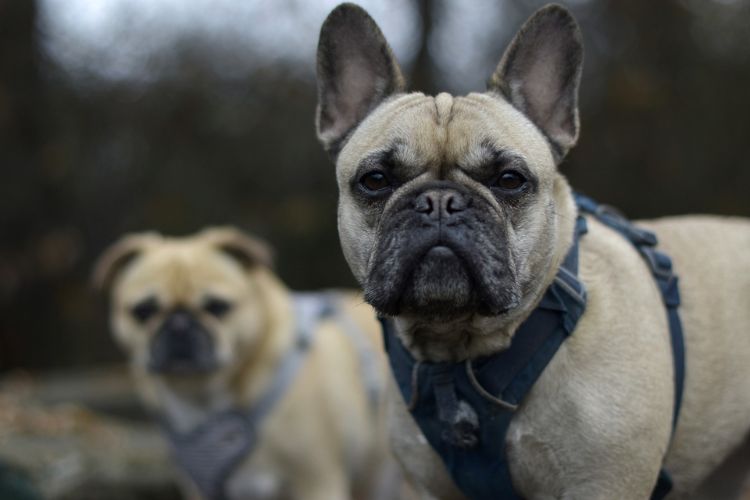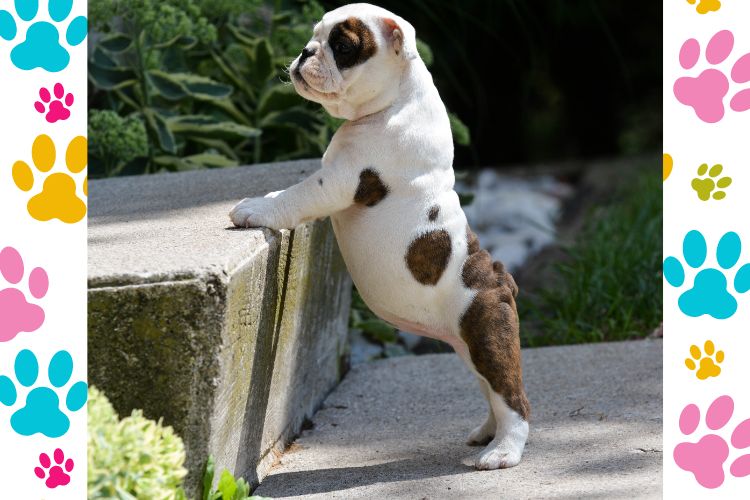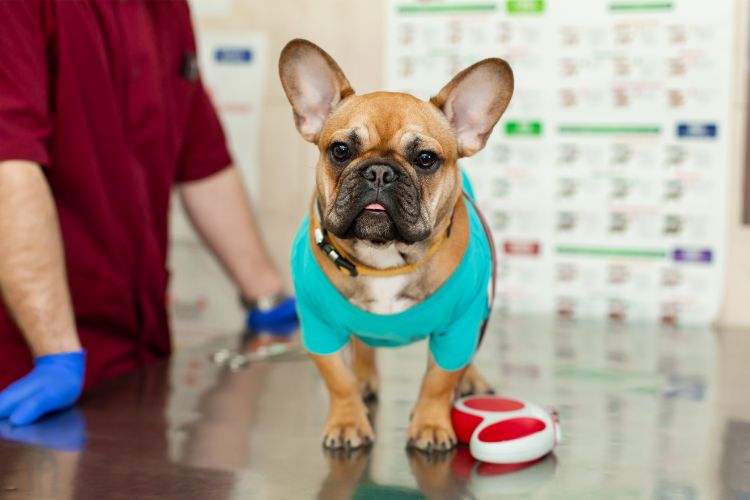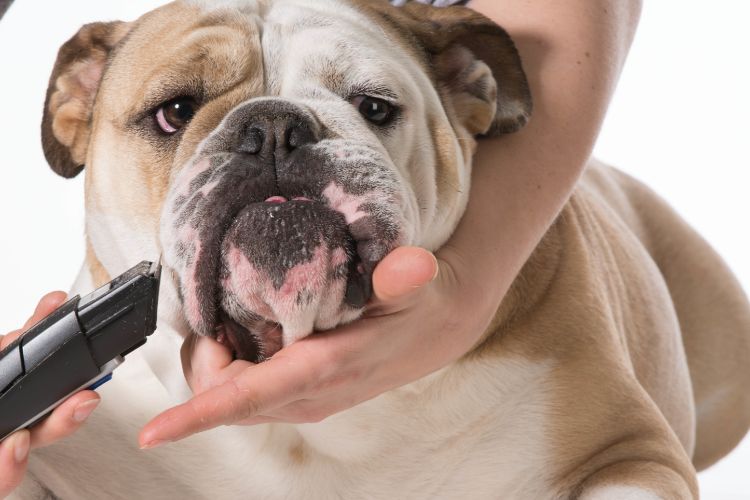Even if you prefer large dog breeds, the French Bulldog will pull at your heartstrings with their lovable and charismatic personality. The French Bulldog has become one of the most popular dog breeds today.
Their adorable appearance, playful nature, and affectionate temperament have captured the hearts of dog lovers worldwide. Whether you live in a small apartment or a spacious house, this small and quirky breed will bring plenty of joy and companionship.
Even though the Frenchie is a small, compact breed that seems easy to care for, it’s essential to know everything you can about the Frenchie. French Bulldogs are brachycephalic and need extra TLC when breathing and being in hot climates.
They also could be better swimmers and should always be supervised near water. Frenchies may also be prone to food and skin allergies and facial dermatitis, so pet insurance is always a good idea.
You’ll also have to keep your Frenchie cool during the summer and take extra care with the skin folds to avoid skin sensitivities. Frenchies tend to overheat quickly and can also become overstressed fast with noisy breathing.
If you’re trying to find out more about the French Bulldog, we’ve got the takeaway. From health, training, AKC-accepted coat colors, breeding tips, and breed history, read on to learn more about this playful and adorable breed.
Frenchie Breathing Issues
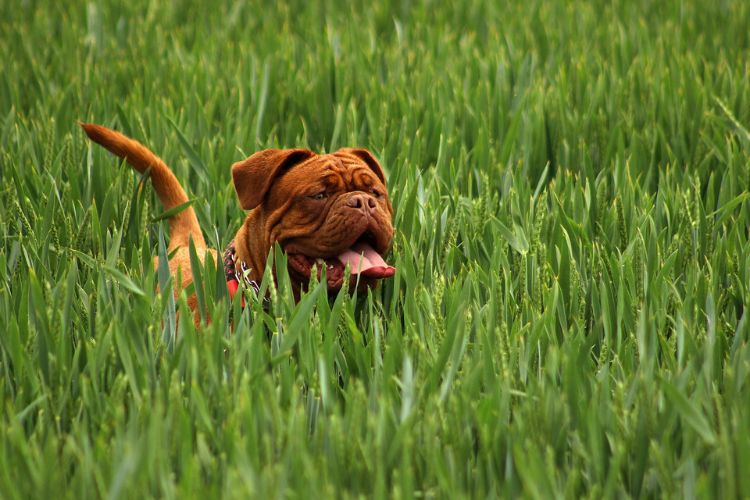
The French Bulldog should never be left unattended near water. This is because the Frenchie is a brachycephalic dogs breed that may be prone to difficult obstructive breathing.
The American College of Veterinary Surgeons (AVVS) says that this is because of the ” combination of elongated soft palate, stenotic nares, and everted laryngeal saccules.”
Most Popular Breed in 2023
Friendly, quirky, and affectionate, the French Bulldog ranks #1 as the most popular breed in 2023 and has been climbing for five years. The American Kennel Club (AKC) says that this breed is known for being adaptable and comfortable in most environments, making them a perfect companion for city or countryside living.
The French Bulldog
Breed Overview
- Group: Non-sporting
- Height: 11 to 13 inches
- Weight: 19 to 28 pounds
- Coat: Short, smooth fur
- Coat Color: Brindle, fawn, white, or combinations of brindle and white or fawn and white
- Life Span: 10 to 12 years
- Temperament: Playful, friendly, loyal, affectionate, lively, sociable
- Hypoallergenic: No
- Origin: France
French Bulldog History
If you’re like us and obsessed with this small, muscular dog breed, you will want to learn more. The French Bulldog, also known as the Frenchie, is a popular and lovable breed with a rich history. The Frenchie’s origins can be traced back to 19th-century France, where it was developed as a smaller version of the English Bulldog.
During the Industrial Revolution, English lace workers migrated to France, bringing their Bulldogs with them. These Bulldogs were crossed with local breeds, such as terriers and pugs, resulting in a compact, muscular dog with a unique appearance and friendly disposition.
This new breed quickly gained popularity among the working class in France.
In the late 1800s, these small Bulldogs were recognized as a distinct breed, and they became especially favored by Parisian artisans, including lacemakers, butchers, and café owners. Their charming personalities and adaptability to urban living made them cherished companions.
The Frenchie’s distinctive bat ears are one of its most recognizable features.
However, these erect ears weren’t always common. Early French Bulldogs had rose-shaped ears, similar to those of English Bulldogs. It was when American breeders started selectively breeding for the bat ear trait that it became the breed standard.
French Bulldogs gained international recognition when they were first exhibited in the United States in the late 19th century. They quickly became popular pets among Americans, and breed clubs formed to preserve and promote the breed.
The French Bulldog Club of America was founded in 1897 and significantly shaped the breed’s development and standard.
How to Choose a Frenchie Puppy?
Captivated by the adorable charm of French Bulldog puppies, dog enthusiasts find themselves drawn to their large square heads, perky “bat-like” ears, and smooth coats. As one delves into the world of Frenchie pups, the question arises: How does one choose the perfect French Bulldog puppy?
Responsible French Bulldog breeders understand the significance of selecting a healthy and well-bred puppy, even if you won’t show your Frenchie.
The French Bulldog Club of America says responsible French Bulldog breeders should always strive to” produce a quality dog that exhibits the historical structure of a French Bulldog, and a healthy dog…thereby improving quality of life and longevity.”
Here’s what to look for:
Physical Health Evaluation
When selecting a French Bulldog puppy, assessing their physical health is key. Prospective owners should look for clear and bright eyes, as dull or watery eyes could indicate underlying health issues.
A healthy skin and shiny coat show a healthy Frenchie puppy, while any signs of redness, rashes, or excessive itching should raise concerns.
Additionally, prospective pet parents should ensure that the skin and coat of the puppy are clean and free from any signs of infection. Eyes should also be free of infection, dirt or debris.
French Bulldogs may be prone to certain genetic health predispositions like many purebred dogs. Potential pet parents should familiarize themselves with these health conditions to provide the best care possible for their pups.
Here are some common genetic health concerns that French Bulldogs may face:
Brachycephalic Airway Syndrome:
French Bulldogs have a flat face and short nose, which can lead to breathing difficulties. This syndrome encompasses respiratory issues such as stenotic nares (narrow nostrils), elongated soft palate, and a collapsing trachea. Pet parents should watch out for signs of labored breathing, snoring, or excessive panting.
Intervertebral Disc Disease (IVDD):
IVDD is a condition characterized by the degeneration or herniation of the discs in the spine. French Bulldogs are susceptible to this condition due to their compact and sturdy bodies. Symptoms may include back pain, difficulty walking, or even paralysis in severe cases.
Hip Dysplasia:
Hip dysplasia is a condition where the hip joints do not develop properly, leading to improper alignment and wear and tear. It can cause discomfort, lameness, and even arthritis. Regular exercise, a balanced diet, and a healthy weight can help reduce the risk of hip dysplasia.
Luxating Patella:
This is a condition where the kneecap slips out of its normal position, causing pain and difficulty in walking. French Bulldogs may be prone to this condition due to their structural conformation. Close monitoring and appropriate treatment may be necessary if a luxating patella is diagnosed.
Allergies:
French Bulldogs can be susceptible to allergies, which may manifest as skin irritations, itching, and recurrent ear infections. Food, environmental factors, or other allergens can trigger allergies. Identifying and addressing the specific allergen is important in managing this condition.
Eye Issues:
French Bulldogs are prone to certain eye conditions such as cherry eye (prolapse of the gland in the third eyelid), cataracts, and progressive retinal atrophy (PRA). Regular eye examinations by a veterinarian can help detect and manage these issues.
Breeding Practices and Parental Health
Reputable French Bulldog breeders prioritize the well-being of their dogs and actively engage in responsible breeding practices. Prospective owners should inquire about the mother’s breeding history when inquiring about a litter.
Ideally, a French Bulldog should have only one litter per year, with adequate rest intervals between pregnancies. This approach ensures the mother’s health and prevents potential complications.
Furthermore, prospective owners should find out about the health of the puppy’s mother and father to assess their genetic backgrounds and potential hereditary conditions.
Living Conditions and Socialization
The early weeks of a French Bulldog puppy’s life play a vital role in their development. Prospective owners should inquire about the living conditions and environment in which the puppies have been raised.
A well-socialized puppy will adapt more quickly to new surroundings and experiences. Exposure to different sounds, people, and other animals during their early stages ensures they become confident and well-adjusted companions.
How to Give Your Frenchie a Healthy Lifestyle
The French Bulldog can be prone to obesity and needs to be fed a healthy diet. Today, as part of the healthy movement, there’s a huge shift toward purchasing fresh and minimally processed dog food containing no added sugar, salt, or non-GMO ingredients.
Look for ingredients that you recognize and that provide good nutrition and health. Skin and coat health is important, too, even though your Frenchie has a short coat.
Consistent Positive Training for Good Behavior
Training your French Bulldog from an early age is essential for instilling good behavior. Use positive reinforcement techniques such as rewards, high-value treats and praise to encourage desired behaviors.
Consistency is key, so establish a routine and stick to it. Focus on commands like sit, stay, and come and proper leash manners.
Regular Exercise to Keep Them Active
French Bulldogs may not require intense exercise like some larger breeds but still need regular physical activity. Daily walks or play sessions in a secure area will help keep them active and prevent weight gain.
You should always provide your Frenchie with mental stimulation through interactive toys, puzzle games, and daily exercise to help maintain a healthy weight.
Balanced Diet for Optimal Nutrition
A well-balanced diet is crucial for your French Bulldog’s overall health. Opt for high-quality dog food formulated specifically for small breeds. Consult with your veterinarian to determine your Frenchie’s appropriate portion sizes and feeding schedule. Avoid overfeeding, as they are prone to obesity.
Preventive Care and Regular Vet Check-ups
Regular veterinary check-ups are essential for maintaining your French Bulldog’s health. Schedule annual vaccinations, flea and tick prevention, and heartworm medication.
Your vet can also monitor their dental health and recommend appropriate dental pet care products. Additionally, be proactive in preventing common health issues such as allergies, breathing difficulties, and skin infections.
Grooming for a Clean and Happy Frenchie
French Bulldogs have a short coat that requires minimal grooming. They shed minimally but need weekly brushing with a grooming mitt to help remove loose hair and keep their coat shiny.
You should also clean their facial folds every day with natural puppy wipes, especially after eating, and clean their ears regularly to prevent infections. Trim their nails regularly and brush their teeth to ensure good oral hygiene.
FAQ’s
Q: What to ask a breeder about French Bulldogs?
Here are a few essential questions for your breeder when purchasing a French Bulldog puppy.
Here are some of the most important questions to ask:
- What is the health history of the parents? Inquire about any known health issues in the lineage and ask if the parents have been screened for common breed-specific conditions such as hip dysplasia, brachycephalic airway syndrome, or eye problems. This information will give you insight into your puppy’s potential health risks.
- Can I meet the mother and father of the puppy? Interacting with the puppy’s parents to observe their temperament and behavior is beneficial. Meeting the dam and sire can give you an idea of what to expect from your puppy regarding personality traits, energy levels, and overall disposition.
- How are the puppies socialized? Socialization is crucial for a well-rounded French Bulldog. Ask how the breeder has exposed the puppies to different environments, people, and experiences. A breeder who prioritizes early socialization helps ensure that your new companion will be confident and adaptable in various situations.
- What kind of care and training have the puppies received? Find out about the routine care provided to the puppies, including feeding, grooming, and exercise. Additionally, inquire about any initial training or basic commands they have been introduced to. This information will help you continue their care and training seamlessly.
- What is the breeder’s policy on health guarantees and contracts? It’s essential to understand the breeder’s policies regarding health guarantees, return policies, and any contractual agreements. Clear communication about these aspects will provide peace of mind and ensure that both parties have a mutual understanding of responsibilities and expectations.
Q: Do French Bulldogs require a lot of exercise?
A: French Bulldogs have moderate exercise needs. They enjoy daily walks and playtime but are moderately active. Be mindful of their brachycephalic (short-nosed) nature, as they can struggle in extreme heat or during intense exercise.
Q: Are French Bulldogs prone to health issues?
A: Unfortunately, French Bulldogs are prone to certain health issues due to their unique physical features. Common concerns include breathing difficulties, allergies, and spinal disorders.
Regular veterinary check-ups and proper care can help manage these potential issues. Don’t forget about pet insurance for Frenchies to help you with unexpected veterinary bills.
Q: How big do French Bulldogs get?
A: French Bulldogs are a small to medium-sized breed. On average, males typically weigh between 20-28 pounds (9-13 kg), while females weigh around 16-24 pounds (7-11 kg).
What’s it Like Owning a French Bulldog?
Video Credit: Ginger Cat


